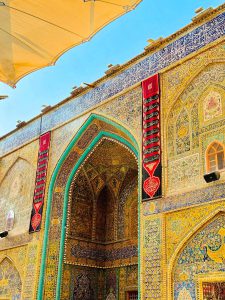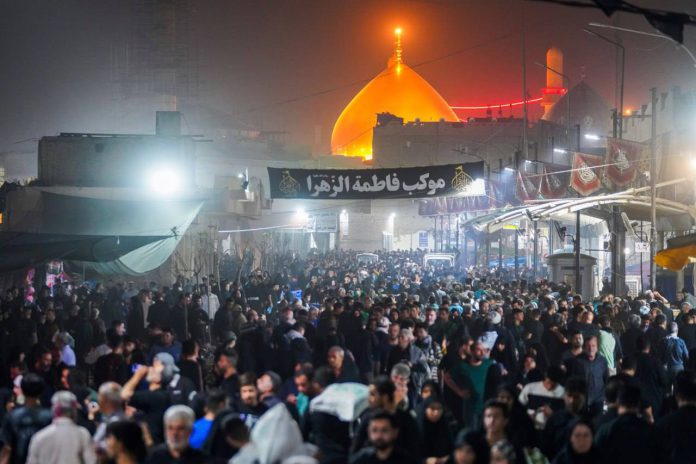Meta Description: Arbaeen (اربعین) pilgrimage, the world’s largest peaceful gathering, draws millions to Karbala as Iraqi hospitality and Indian participation highlight devotion to Imam Hussain’s legacy of justice and truth.
By Dr. Mohammad Farooque
Qalam Times News Network، August 17, 2025
Arbaeen and Its Meaning
Arbaeen (اربعین) marks the fortieth day after Ashura, the martyrdom of Imam Hussain ibn Ali (RA), grandson of Prophet Muhammad ﷺ, in the Battle of Karbala in 680 CE. The observance is not only a ritual of mourning but also a reaffirmation of loyalty to Imam Hussain’s stand for justice, dignity, and truth. Today, it has become the largest annual peaceful gathering in the world, bringing together an estimated 20–25 million participants—surpassing even the Hajj in sheer numbers.
The Journey of Devotion

From Najaf to Karbala, a distance of nearly 90 kilometers, pilgrims endure days of walking through scorching heat and cold nights. Chants of “Labbayk Ya Hussain” (Here I am, O Hussain) echo across Iraq as processions converge from Basra, Baghdad, Hilla, Kufa, and other cities. What began as the journey of the Prophet’s companion Jabir ibn Abdullah to Karbala soon after the tragedy has grown into a river of humanity. The tradition was later formalized by scholar Murtaza Ansari nearly two centuries ago and, despite suppression during Saddam Hussein’s regime, has continued to thrive.
Thousands of devotees from India have joined this year’s Arbaeen (اربعین) pilgrimage. Congress MLA Amin Patel, walking alongside corporator Javed Juneja and Shia scholar Maulana Zaheer Abbas Rizvi, described the experience as “not merely a physical walk but a spiritual bond with Imam Hussain, who sacrificed everything for humanity.” Mumbai resident Asad Ali Shabbir Mukadam, who has joined the walk for over a decade, said each journey deepens his devotion. Many Indian pilgrims carried the national flag, as this year’s Arbaeen (اربعین) coincided with Independence Day on August 15.
Iraqi Hospitality at Its Finest


What sets Arbaeen (اربعین) apart is not only its massive scale but the extraordinary generosity of the Iraqi people. Roadsides are lined with thousands of mawakib—tents offering free food, water, shelter, and medical care. Families, farmers, shopkeepers, and even children participate, often saving throughout the year to serve pilgrims. Visitors are welcomed with tea, fruit, and sweets, while elderly hosts massage weary travelers’ legs and children fan them against the desert heat. For Iraqis, serving the guests of Imam Hussain is not charity—it is worship.
A Universal Message
Though Arbaeen (اربعین) is rooted in Shia tradition, the gathering is not confined by sectarian lines. Sunnis, Christians, Yazidis, and even non-believers join the walk, inspired by Imam Hussain’s universal message of resistance against injustice. Media outlets, including Mumbai’s WIN channel, have been broadcasting live coverage of the pilgrimage, sharing scenes of devotion and sermons by scholars with audiences back home.

In the end, Arbaeen (اربعین) is more than a pilgrimage. It is a living reminder of Imam Hussain’s defiance against tyranny and a symbol of human solidarity. Through their unmatched hospitality, the people of Iraq show the world that generosity is measured not by wealth but by spirit, and that service to others is the truest expression of faith.







